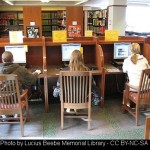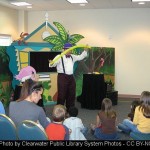By CYN LoPINTO
Editor-in-chief, gerontologist
______________________________________________________________________________
 If you grew up between the 1950s and 1970s, there is a good chance you spent some time in your neighborhood public library. These libraries were often a staple in the community and the place to go if you needed to research a particular topic or check out a book to enjoy. How many of us can remember getting our first library card and seeing our name in that majestic black type? We became experts at maneuvering the drawers of the card catalog and understanding the inner workings of the Dewey Decimal System.
If you grew up between the 1950s and 1970s, there is a good chance you spent some time in your neighborhood public library. These libraries were often a staple in the community and the place to go if you needed to research a particular topic or check out a book to enjoy. How many of us can remember getting our first library card and seeing our name in that majestic black type? We became experts at maneuvering the drawers of the card catalog and understanding the inner workings of the Dewey Decimal System.
With all the cultural and political changes going on in the 1960s, libraries played an important role during these turbulent times by empowering people through education. In 1966 President Johnson appointed The National Advisory Commission on Libraries (NACL) to examine federal funding as a resource for public libraries. Out of this commission came the establishment in 1970 of the governmental agency known as the National Commission on Libraries and Information Sciences (NCLIS). Its purpose was to ensure that all citizens had access to free informational resources regardless of their setting, physical situation, economic condition or educational level. In 2008, this agency was consolidated under the Institute of Museum and Library Sciences (IMLS) and remains there today.
 Now we are in the age of computer technology, where endless information is just a click away. Are public libraries still relevant? Researching a topic can be accomplished easily through a google search on your phone or laptop. It wasn’t all that long ago when getting that dreaded term paper assignment involved having to trudge back and forth to the library to get the research part of it done. Some of the information needed had to come from “reference” books which were NEVER allowed to be checked out. You had to stay at the library and take lots of notes (unless you could afford the five cents per page copy fee).
Now we are in the age of computer technology, where endless information is just a click away. Are public libraries still relevant? Researching a topic can be accomplished easily through a google search on your phone or laptop. It wasn’t all that long ago when getting that dreaded term paper assignment involved having to trudge back and forth to the library to get the research part of it done. Some of the information needed had to come from “reference” books which were NEVER allowed to be checked out. You had to stay at the library and take lots of notes (unless you could afford the five cents per page copy fee).
If so many of the things we used to rely on from the library can be obtained at home on our computers, what is the role for the modern public library? Do most people value this institution anymore? According to findings from the Pew Research Center’s recent study on libraries, “More than two thirds of Americans agree that libraries are important because they improve the quality of life in a community, promote literacy and reading, and provide many people with a chance to succeed.” This is an important sentiment since part of the funding for public libraries comes from county and local taxes. To benefit any program, you need the support of the community.
 Public libraries today offer a vast array of services. Check-out materials now include e books, dvds, music cds as well as the latest in hard copy/large print/paperback books. You can go on your computer and see what titles are at which branches, place a request for an item or even suggest a book you are looking for. When your item comes in, you get an email or text letting you know that it is waiting for you. And all this is for free!! It is the perfect combination between the traditional aspects of the library we grew up with, and the technological features we are accustomed to. Also, most public libraries provide free wireless internet access as well as computers for patrons to use. Technology training is offered for those having trouble and needing assistance. This is especially important for anyone without a computer or internet access at home.
Public libraries today offer a vast array of services. Check-out materials now include e books, dvds, music cds as well as the latest in hard copy/large print/paperback books. You can go on your computer and see what titles are at which branches, place a request for an item or even suggest a book you are looking for. When your item comes in, you get an email or text letting you know that it is waiting for you. And all this is for free!! It is the perfect combination between the traditional aspects of the library we grew up with, and the technological features we are accustomed to. Also, most public libraries provide free wireless internet access as well as computers for patrons to use. Technology training is offered for those having trouble and needing assistance. This is especially important for anyone without a computer or internet access at home.
 The other major advantage of a neighborhood public library is its social contribution. On-site classes include subjects such as health issues, employment training, computer tutoring, household concerns and financial planning. Recreational opportunities and hobby-specific clubs are also offered. Most libraries have a very active children’s program. Story time activities, guest speakers and reading-incentive events make the library a fun and positive place for kids. Book clubs for both adults and children have become an integral part of the library scene. Here, instead of its usual solitary status, reading becomes a group activity. More than ever, the library is a wonderful place to meet your neighbors, learn something new and share common interests.
The other major advantage of a neighborhood public library is its social contribution. On-site classes include subjects such as health issues, employment training, computer tutoring, household concerns and financial planning. Recreational opportunities and hobby-specific clubs are also offered. Most libraries have a very active children’s program. Story time activities, guest speakers and reading-incentive events make the library a fun and positive place for kids. Book clubs for both adults and children have become an integral part of the library scene. Here, instead of its usual solitary status, reading becomes a group activity. More than ever, the library is a wonderful place to meet your neighbors, learn something new and share common interests.
So if you haven’t stepped inside your local library in quite a while, it may be time to dust off that library card and give it a try. Browse through the shelves and see all that is available. Peek at the community board and look into what classes, seminars and workshops interest you. Be sure to remind yourself that this is all available for free. Then re-live the excitement of checking out those carefully chosen books and taking them home to read. Just remember to write down that all-important return due date. You don’t want to be on the mortifying “overdue” list and have to pay a fine!
Cynthia Lopinto
Latest posts by Cynthia Lopinto (see all)
- Honey Chocolate–Covered Pretzels - April 3, 2018
- True Colors - April 3, 2018
- Spring Cleaning…You’ve Gotta Be Kidding - April 2, 2018
- Should You Stay In Your Home Or Move During Retirement? - April 2, 2018
- Hawaiian Plants For Good Health - April 2, 2018
 Home Front Magazine A Publication for Seniors
Home Front Magazine A Publication for Seniors

